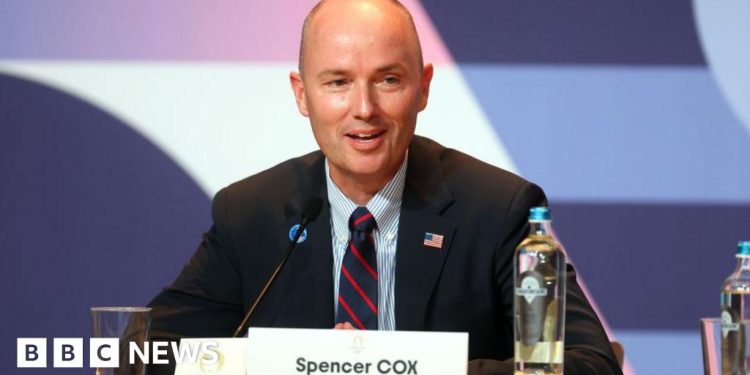UTAH has become the first American state to ban the use of fluoride in its public water, following concerns raised by the Secretary of Health, Robert F Kennedy, that the mineral presents potential health risks.
Governor Spencer Cox signed the ban this week, which will come into force on May 7. Other states, including Florida and Ohio, weigh similar legislation.
Fluoride has been added to American drinking water since 1945 to prevent cavities.
UTAH’s decision to withdraw the mineral was criticized by experts, who are worried, this will have consequences for oral health, especially for children.
The bill, signed by COX Thursday, prohibits communities from adding fluoride to their public water supplies.
The law does not mention any public health problem linked to the mineral, but the republican state legislative Stephanie Gricius – which presented the bill to the state legislature – argued that there is research suggesting that fluoride could have possible cognitive effects in children.
Gricius said that his bill would give citizens the choice whether they wanted to consume fluoride or not.
This concern about fluoride has already been raised by Kennedy, the American secretary for health, who said in November that “the White House Trump will advise all American water systems to eliminate fluoride from public water”.
He alleged that the chemical product found in toothpaste and regularly used by dentists “is an industrial waste associated with arthritis, bone fractures, bone cancer, IQ loss, neurodevelopmental disorders and thyroid diseases”.
Most public health experts have rejected these allegations and alleged that Kennedy had cited data from the studies carried out in countries with much higher fluorine levels in their water systems than the United States.
The American Dental Association strongly criticized UTAH for its decision, saying that it shows “a free contempt for oral health and well-being of their voters”.
“It is discouraging to see that a proven public health policy, which exists for the greatest good of oral health of an entire community, has been dismantled on the basis of a distorted pseudoscience,” said the president of the association, the dentist of Denver, Brett Kessler, in a press release.
Many public health groups, including the American Academy of Pediatrics and the Centers for Disease Control and Prevention, have long supported the addition of small amounts of fluorine with drinking water.
The American Public Health Service has reduced the amount of fluorine that it recommended to add to water in 2015, but the federal government has encouraged states since the 1960s to add small amounts of chemicals to water to help prevent cavities and help oral health.
The recent decisions of the court led to the reduction of fluoride in American water, and some experts have questioned the continuous need for water systems given its broad availability in toothpaste and other dental products.
Most of Western Europe does not add fluoride to its water. In England, about one in 10 people fluoted drinking water, although a program has since been introduced into fluorescent water for 1.6 million people in northeast England.
On the other hand, around 63% of the American population has fluorinated water.
Experts who support the implementation of fluorine in water indicate that studies show that community water fluoridation prevents at least 25% of dental caries in children and adults.
“The scientific weight of solid evidence on the benefit of the fluoridation of community water is clear and convincing,” said American Dental Association in October of last year.
Professor Avijit Banerjee, president of cariology and operating dentistry at King’s College in London, previously told the BBC that “the potential harmful effects of the cited fluorine had not been associated with the very low fluoride levels used in water fluoridation programs”.


